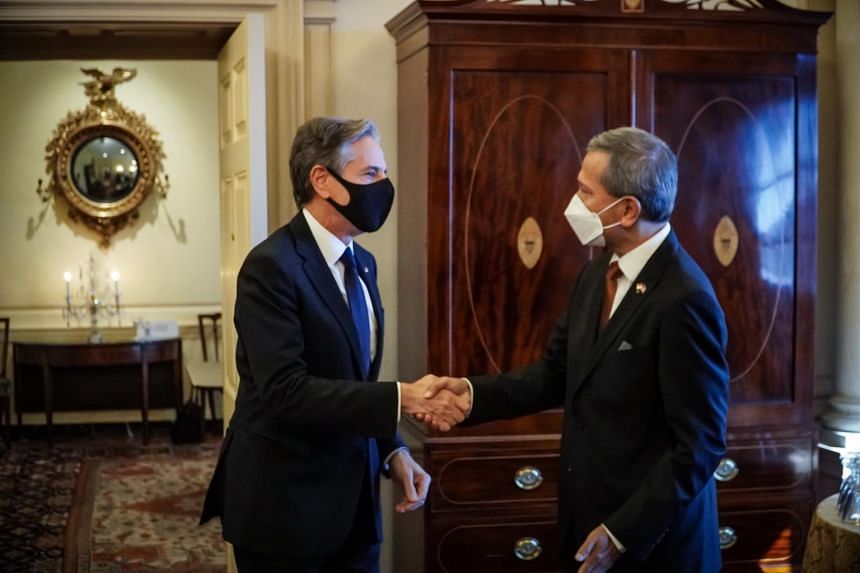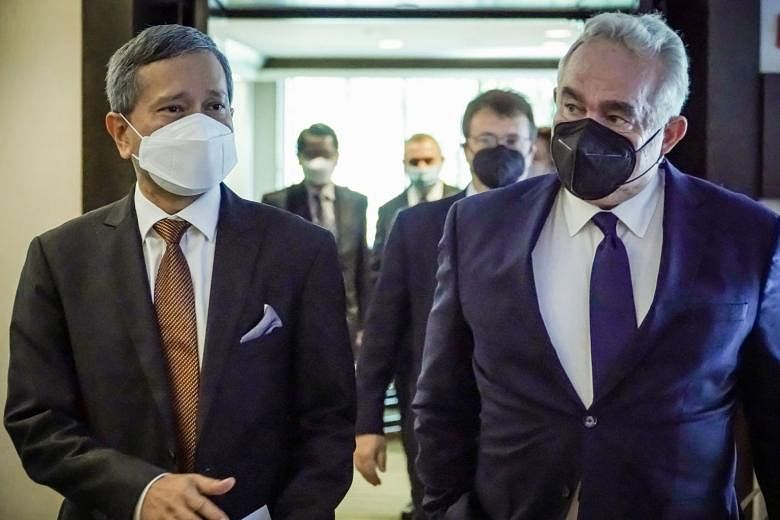WASHINGTON - The United States should consider Asean - with its 650 million population, and US$2.8 trillion (S$3.8 trillion) GDP set to double and subsequently quadruple in the next two decades - in its own right, Minister for Foreign Affairs Dr Vivian Balakrishnan said in Washington on Wednesday (Sept 29) after winding up a three-day working visit to the US capital.
That was a key component of the message he put across in meetings in Washington, including with Democratic Senator Bob Menendez, Senate Foreign Relations Committee chairman; and Congressional Singapore Caucus co-chairs, Congressmen Rick Larsen - a Democrat from Washington state - and David Schweikert, a Republican from Arizona.
Earlier, he met with Coordinator for Indo-Pacific Affairs Kurt Campbell, and Secretary of State Antony Blinken.
He noted concern and anxiety over the rise of China, but also an awareness of the consequences of any clash by accident or design.
He pointed out that South-east Asia was worth investing in, in many areas from trade to the digital economy. And he discussed pandemic preparation and secure supply chains.
"As far as South-east Asia is concerned, we recognise the stakes are very high, the dynamics of the US-China relationship has got enormous consequences," he told the Singapore media.
"But, South-east Asia does not want to become a token, or a lever, or an arena, for proxy contest between the two superpowers" he said.
The US is the largest investor in South-east Asia, with more invested in the region than it has in India, China, Japan and even Korea combined, he said. "In other words, America has skin in the game."
He added: "On the other side of the ledger, China is the biggest trading partner for virtually all of us in South-east Asia, But, if you ask the Chinese, the largest trading partner for China is now Asean, it's South-east Asia."
Great opportunities will be emerging in the region in the next two decades, he said. "Take South-east Asia seriously on our own merits and (don't) just look at us in terms of the great big power competition."
Dr Balakrishnan reiterated that for South-east Asia, trade and investment are strategy. "It's economics that drives the strategy" he said.
And he made a pitch for the US to consider the CPTPP (Comprehensive and Progressive Agreement for Trans-Pacific Partnership).

The US helped shape the CPTPP in its previous 12-nation incarnation, the TPP (Trans Pacific Partnership). But one of former president Donald Trump's first acts after taking office in January 2017, was to pull the US out of what he called the "job killing" trade pact - to the dismay of the other 11 nations which went ahead anyway with the CPTPP.
Thus far, the Administration of US President Joe Biden has not made any move to rejoin. Many experts have argued that the US has erred in vacating that particular space. Significantly, on Sept 16, China formally submitted a request to accede to the CPTPP.
"If you look at the details in terms of intellectual property protection, labour protection, environment protection, this (the TPP) would have been the most high standard ambitious multilateral free trade agreement in recent memory" Dr Balakrishnan said.
"In the last two weeks, China has come knocking at the door" he said.
"The UK had put up its hand earlier, and then later on Taiwan as well.
"So there is this piece of the jigsaw which is an icon of economic integration, trade, investment, across the Pacific and the United States will have to decide its role in this."
"It's ironic that having been there at the creation and having substantially negotiated a very ambitious free trade agreement, that the United States should not have any role at all in the emerging economic architecture in South-east Asia" he said.
Dr Balakrishnan acknowledged that the political mood in the US may not be right for Washington to rejoin, but nevertheless "this is a strategic point that needs further debate and discussion" he said.
Another emerging opportunity is in the digital field, he noted. China had noticed that Singapore has negotiated a digital economy partnership with Chile and New Zealand, he said. Singapore was also discussing it with the UK and others. "This is something America ought to be interested in" he said.
Green agreements facilitating investments in renewable energy, energy conservation and efficiency, and technologies of the future, are also areas for the US to explore, he said.
"And then of course there were discussions on the pandemic and in particular, the need not only to produce and distribute vaccines widely across South-east Asia, but also the need to have resilient, reliable supply chains" he said.
Dr Balakrishnan also noted bipartisan concern and even anxiety in Washington over the rise of China.
But he also got a clear signal that "everyone is painfully aware of the enormous consequences if a collision either by design or unwittingly by accident occurs" between the two powers.
"America has never faced a arrival on this order of magnitude and sophistication," Dr Balakrishnan said.
"Now, if that's not enough, you have another revolution in play. And that is the digital revolution. And that is disrupting jobs, wages, is causing anxiety throughout society, and in particular even in the middle classes, because people worry, what's going to happen to my job, am I going to be replaced either by competition or by technology?"
This had triggered a pushback all over the world including Singapore, he said, with some advocating barriers to shield themselves from competition.
"I don't believe this Singapore can afford to do this," the minister said. "Singapore, in fact, needs to double-down to… remake, re-skill" to go after the jobs and the opportunities of the future... We have both great dangers and great opportunities."
He added: "The optimist in me believes there is a real prospect for a golden age ahead of us. We (Singapore) have to think quickly, carefully, and be a constructive player. This will also give us, I think, great opportunities even for a tiny city state like Singapore."


